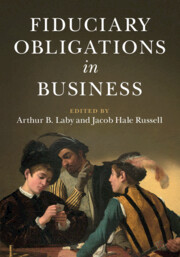Description
Fiduciary Obligations in Business
Coordinators: Laby Arthur B., Russell Jacob Hale
Leading scholars analyze key issues in fiduciary duties in business―one of the most salient applications of fiduciary law and theory.
Language: English
Subject for Fiduciary Obligations in Business:
Fiduciary Obligations in Business
Publication date: 06-2023
Support: Print on demand
Publication date: 06-2023
Support: Print on demand
Fiduciary Obligations in Business
Publication date: 09-2021
400 p. · 18.5x26.3 cm · Hardback
Publication date: 09-2021
400 p. · 18.5x26.3 cm · Hardback
Description
/li>Contents
/li>Biography
/li>
The scholarship on fiduciary duties in business organizations is often pulled in two directions. While most observers would agree that business organizations are one of the key contexts for the application of the fiduciary obligation, corporate law theorists have often expressed disdain for the role of fiduciary duties, with the result that fiduciary law and theory have been out of step with the business world. This volume aims to rectify this situation by bringing together a range of scholars to analyze fiduciary relationships and the fiduciary obligation in the business context. Contributing authors examine fiduciary obligations in fields ranging from entity structure to bankruptcy to investment regulation. The volume demonstrates that fiduciary law can inform pressing corporate governance debates, including discussions over stakeholder models of the corporation that move beyond shareholder interests.
Part I. Identifying Fiduciaries and Their Duties: 1. Fiduciary duties on the temporal edges of agency relationships Deborah A. DeMott; 2. Extra large partnerships Christine Hurt; 3. The three fiduciaries of Delaware corporate law—and Eisenberg's error Lyman Johnson; 4. Trust, discretion, and ERISA fiduciary status Arthur B. Laby; 5. Examining indenture trustee duties Steven L. Schwarcz; Part II. Gaps and Alternatives in Fiduciary Regimes: 6. Conflicts of interest in investment advice: an expanded view Quinn Curtis; 7. A system of fiduciary protections for mutual funds Howell E. Jackson; 8. Equitable duty: regulating corporate transactions in the vicinity of insolvency from a comparative perspective Edward J. Janger; 9. Equity, majoritarian governance, and the oppression remedy Paul B. Miller; 10. Fiduciary relationships in employee benefit plans Dana M. Muir; Part III. Historical and Comparative Perspectives: 11. Delaware corporate law and the 'end of history' in creditor protection Jared A. Ellias and Robert J. Stark; 12. The independent director in Delaware and German corporate law Christoph Kumpan; 13. For whom are non-profit managers trustees? The contractual revolution in charity governance Jacob Hale Russell; 14. Fiduciary law and Japanese nonprofits: a historical and comparative synthesis Masayuki Tamaruya; Part IV. Stakeholders and Society: 15. Corporations, directors' duties and the public/private divide Jennifer G. Hill; 16. Stakeholder impartiality: a new classic approach for the objectives of the corporation Amir N. Licht; 17. Shareholder primacy in benefit corporations Julian Velasco; 18. Self-interested fiduciaries and invulnerable beneficiaries: when fiduciary duties don't fit Kelli Alces Williams; Index.
Arthur B. Laby is Professor of Law at Rutgers Law School and Co-Director of the Rutgers Center for Corporate Law and Governance.
Jacob Hale Russell is Associate Professor of Law at Rutgers Law School.
Jacob Hale Russell is Associate Professor of Law at Rutgers Law School.
© 2024 LAVOISIER S.A.S.




